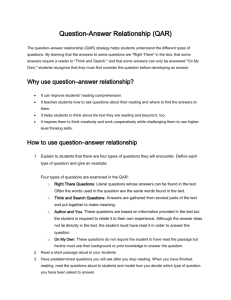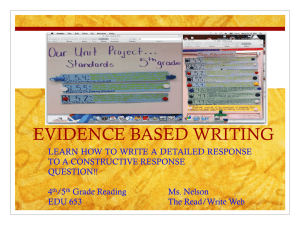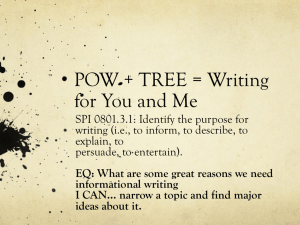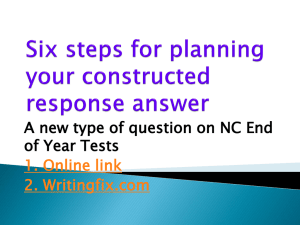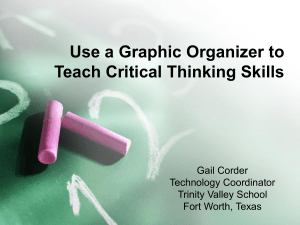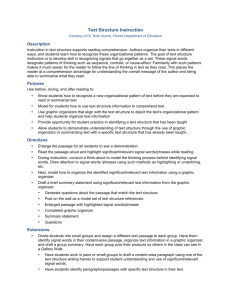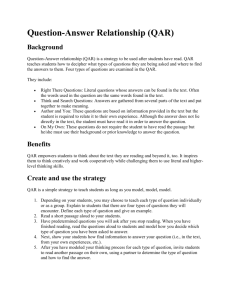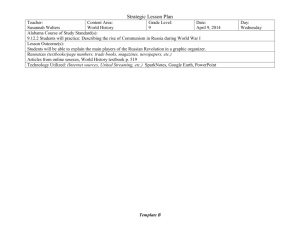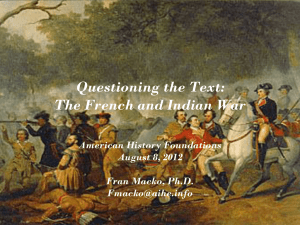evidence based writing
advertisement
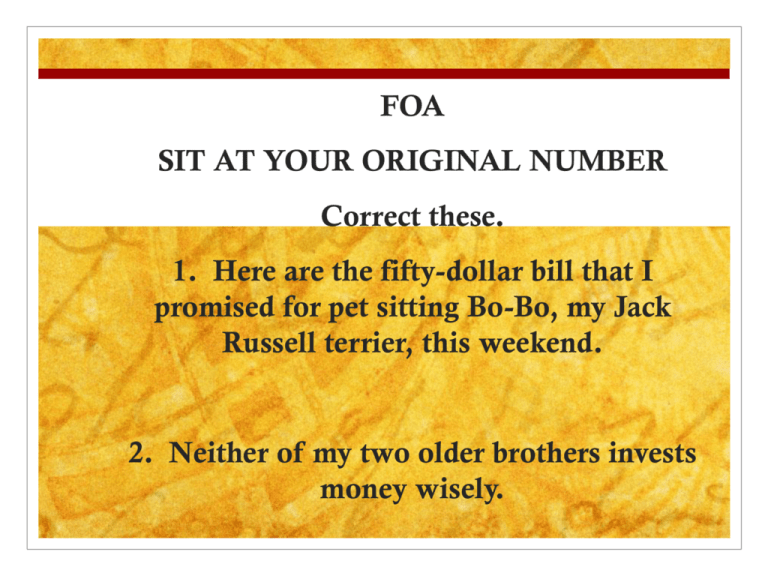
FOA FOA SIT AT YOUR ORIGINAL NUMBER Correct these. 1. Here are the fifty-dollar bill that I promised for pet sitting Bo-Bo, my Jack Russell terrier, this weekend. 2. Neither of my two older brothers invests money wisely. EVIDENCE BASED WRITING LEARN HOW TO WRITE A DETAILED RESPONSE TO A CONSTRUCTIVE RESPONSE QUESTION!! The Read/Write Web Welcome and Introduction: WELCOME!! This powerpoint is based on lessons that will help students develop strategies and practice writing a well developed evidence based response to specific guided comprehension question. Students will be able to work through reading selections and use specific graphic organizers to write an evidence based response to a specific comprehension question. Learning Standards: Common Core State Standards Reading Standards for Literature RL.8.1 Quote accurately from a text when explaining what the text says explicitly and when drawing inferences from the text Reading Standards for Informational Text RI.8.8 Explain how an author uses reasons and evidence to support particular points in a text, identifying which reasons and evidence support which point(s) Writing Standards W.8.8. Recall relevant information from experiences or gather relevant information from print and digital sources; summarize or paraphrase information in notes and finished work, and provide a list of resources. Learning Objectives: Students Will Be Able To (SWBAT): Determine how to find evidence to support the claim Write a detailed response to a given question about the passage and support you response with evidence from the text Determine and identify specific strategies to write out a well thought out response to specific questions related to the text Questions to Think About?? What is evidence? Where can we look to find our evidence today? How do we find the evidence needed to support the claim? Why do we need evidence? When do we look for evidence? Will a graphic organizer help you determine types of evidence you will use to support the claim? Our Acronyms: Remember our Acronyms for writing a BCR (Brief Constructed Response): RACE and SLAMS R Restate the Question. A Answer the Question. C Cite evidence from the text, graphs, data, or pictures. E Extend your thinking. Make a connection to self, another text or the world. Acronyms: SLAMS S Sentence: Write your answer in complete sentences. L Lines: The number of lines on answer sheet gives you an idea of how long your answer should be. A all Answer: Answer the question the test asks. Answer parts of the question. M Mechanics: Mechanics are punctuation, capitalization, spelling, grammar and usage. S Support: Remember to support your answer with details from the selection. Informational Text: Remember informational text is just that…information about a specific topic or content!! Informational text may use to compare/ contrast, demonstrate cause/ effect relationships and may use charts or graphs. Textbooks are sources of informational text we have used in class. Can you think of any other forms of informational text we have also used in class? As you read text remember to think about the strategies for answering specific types of questions. Think about who and what the passage is about. Think about the question being asked and support your answer with evidence from the text. QAR Strategy: QAR is a strategy that helps students understand types of questions. Understanding the type of question being asked will allow you to be able to decide and develop a strategy to answer the question. Four Types of Questions examined using the QAR strategy: Right There Questions Think and Search Questions Author and You Questions On My Own Questions For information and examples check this link.. http://www.readingrockets.org/strategies/question_answer_relationship QAR Video: CLICK ON THE VIDEO LINK BELOW TO LEARN MORE ABOUT THE QAR STATEGY!! View the video below to learn more about the QAR strategy and see if you are ready to try it on your own! Read and listen to the video and think about the types of questions being described. Where would evidence based questions be found? How can you use this video to help you answer your questions? Listen to the example and see if you got the questions correct. http-//www.youtube.com/w#142239 **Note Mac Computer Users: The video link may not open correctly, if it does not open here is the link to the video from You Tube. http://www.youtube.com/watch?v=U0o2jUFRpXc&feature=playe r_embedded Organize Your Thoughts: Graphic organizer are great useful tools that help you organize and visualize your thoughts about a specific topic. Examples we have used in class… *KWL Charts *Story Maps *Concept Maps *Timeline Charts *Word Web *Organizational Chart *Evidence Chart *Cause/Effect Chart *Detail Maps AND MANY MORE…Can you think of any more types of graphic organizers we have used in class that allow you to organize and direct your thinking about a specific passage, topic, or content?? Graphic Organizer : Now It Is Your Turn!! GIVE IT A TRY…I KNOW YOU CAN DO IT!! You will read the passage about Michelle Kwan thinking about the claim and how it is supported with evidence in the passage. You will choose one of the graphic organizers to devise and organize your writing plan to support the claim and answer the guided comprehension question. Claim: How did practice and perseverance help Michelle Kwan achieve her goals? Support your answer by using evidence from the text. Links for passage and graphic organizers… http://www.youtube.com/watch?v=cH6z-gwiSRc http://www.biography.com/people/michelle-kwan-11919948
